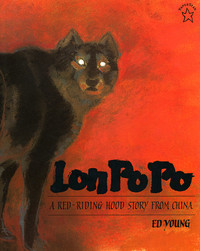Synopsis
The story is set in China. Three sisters, Shang, Tao and Paotze, are left alone overnight while their mother goes to visit their grandmother Po Po's house for her birthday (and to stay over at her mother Po Po's house for the night). Before leaving, the mother warns the girls to be safe. Meanwhile, an old wolf sees the mother leave and decides to come over to harm the children. The wolf pretends to be their grandmother, Po Po, to try to gain entry. The children question the wolf through the door and ask why he has come late. The wolf has clever answers. The two youngest children finally open the door and let the wolf in. Because of the darkness, the children can't see that it is a wolf. When it is time for bed, the children and the wolf are to sleep together. The children notice "Po Po's" wolflike characteristics. They question him. Finally, Shang (the oldest) lights a candle and, before it gets blown out, sees that Po Po is really a wolf. She devises a plan to get herself and her sisters out of the house. She tells the wolf about the delicious, magical gingko nuts that grow on the tree outside their home. The children go out and climb the tree where she tells the other two who Po Po really is, while the wolf follows. They tell the wolf to get a rope and a basket so they can pull him up the tree to get the nuts, all the while planning on dropping the wolf once in the basket. When they drop the basket, the wolf bumps his head. For the third and final time, as the wolf reaches for the nuts, the kids let go of the rope and the wolf is sent down plummeting once more. Not only did the wolf bump his head, but he broke into pieces. The girls are unaware that the wolf is dead, until they get down from the tree and see him on the ground. They check on him and they ask if he is OK. But they hear no answer. (That is, as he is now dead. He broke into pieces.) That night, the girls look at the wolf's dead body and is broken into pieces. Finally, they (after one last look of the wolf's dead and broken body) go inside the house to bed. After the mother's return, the next day they tell her what happened.
This page is based on this
Wikipedia article Text is available under the
CC BY-SA 4.0 license; additional terms may apply.
Images, videos and audio are available under their respective licenses.
